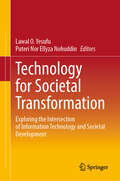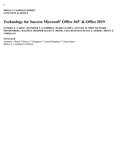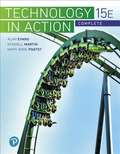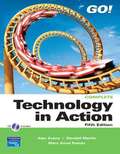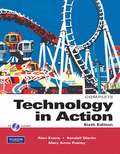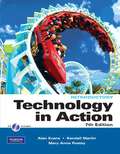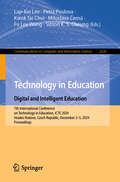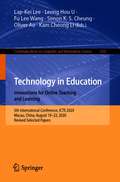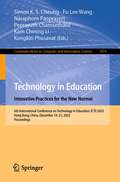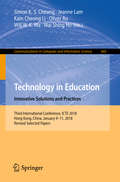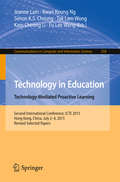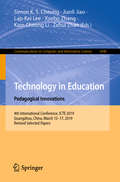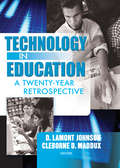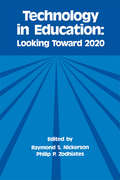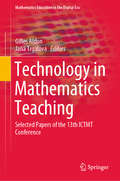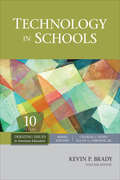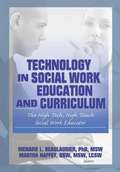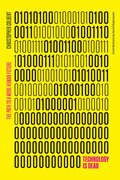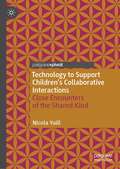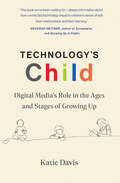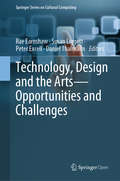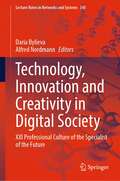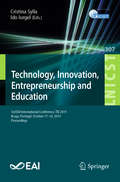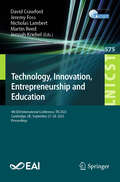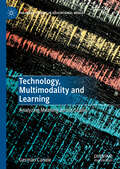- Table View
- List View
Technology for Societal Transformation: Exploring the Intersection of Information Technology and Societal Development
by Lawal O. Yesufu Puteri Nor Ellyza NohuddinThis book extensively investigates the dynamic relationship between information technology and societal transformation. The book explores a range of applied IT uses, ranging from educational technology to the complex applications of cybersecurity, the promise of blockchain technologies, e-commerce and rural development, and social media and its applications in political activism. Investigating key topics in social development and the role information technology plays in elevating our lives, the book navigates this ever-changing landscape of technological innovation to determine how it can be a source for good and improve our lives by driving positive social change. While focusing on the practical application of technology to real-world situations, examples, and cases, the book primarily focuses on educational development, entrepreneurship, sociopolitical transformation, and the security and defence of society. Collectively, these explorations serve to better highlight how technology can be harnessed in the creation of a more inclusive and equitable society. Hence, the book will be a useful read for students, academics, policymakers, business and social investors.
Technology for Success: Microsoft Office 365 and Office 2019 (Shelly Cashman)
by Steven M. Freund Jennifer T. Campbell Barbara Clemens Sandra Cable Mark CiampaMaster the latest version of Microsoft Office and learn how to take full advantage of today's ever-changing world of technology with TECHNOLOGY FOR SUCCESS AND SHELLY CASHMAN SERIES MICROSOFT OFFICE 365 and OFFICE 2019. Part of the highly acclaimed Shelly Cashman Series that has introduced computer skills to millions like you, this edition offers a proven approach that's effective, no matter what your learning style. Meaningful topics within manageable lessons demonstrate how to apply concepts to your academic, professional, and personal lives. A step-by-step, screen-by-screen approach guides you in expanding your understanding of Microsoft Office 2019 through experimentation, critical thought and personalization. Updated activities, case scenarios and an emphasis on employability demonstrate the importance of what you're learning as you master the keys to using Microsoft Office 2019 effectively and become a user of today's technology.
Technology in Action
by Alan Evans Kendall Martin Mary Anne PoatsyAuthors know how readers learn today and help them focus on tasks that they can apply immediately in the workplace, the classroom, and at home. <P><P>The 15th Edition uses practical content, hands-on projects, and coverage of artificial intelligence to provide an engaging learning experience. This in turn helps learners be more prepared, and provides them with the skills they need to be digitally literate in their everyday lives and in the workplace.
Technology in Action (5th Edition)
by Alan Evans Kendall Martin Mary Anne PoatsyThis edition, useful for professionals seeking to enhance their knowledge of computer concepts and literacy, engages students by combining a unique teaching approach with rich companion media. History of the personal computer, virtual computer tour, blogging, file compression and management, installing RAM, installing a computer network and firewall, PDA's, computer architecture, creating and improving an Access database, and constructing a simple Web page are some of the areas covered.
Technology in Action (6th edition)
by Alan Evans Kendall Martin Mary Anne PoatsyTechnology in Action engages students by combining a unique teaching approach with rich companion media. The sixth edition has been updated to reflect the latest developments in computer technology. With an array of fun and engaging learning tools, Technology in Action teaches students computer fundamentals, from learning Microsoft Office to setting up their own home network.
Technology in Action (7th edition)
by Alan Evans Kendall Martin Mary Anne PoatsyFor introductory courses in computer concepts or computer literacy often including instruction in Microsoft Office. A Computer Concepts Text Focused on Today's Student Technology in Action engages students by combining a unique teaching approach with rich companion media. The seventh edition has been updated to reflect the latest developments in computer technology.
Technology in Education. Digital and Intelligent Education: 7th International Conference on Technology in Education, ICTE 2024, Hradec Kralove, Czech Republic, December 2–5, 2024, Proceedings (Communications in Computer and Information Science #2330)
by Fu Lee Wang Lap-Kei Lee Simon K. S. Cheung Kwok Tai Chui Petra Poulova Miloslava ČernáThis book constitutes the refereed proceedings of the 7th International Conference on Technology in Education, ICTE 2024, held in Hradec Kralove, Czech Republic, during December 2–5, 2024. The 21 full papers presented in this volume were carefully reviewed and selected from 65 submissions. They were organized in the following topical sections: online learning, innovation learning, and digital learning; artificial intelligence in education; institutional strategies and practices; learning analytics in education; smart learning environments.
Technology in Education. Innovations for Online Teaching and Learning: 5th International Conference, ICTE 2020, Macau, China, August 19-22, 2020, Revised Selected Papers (Communications in Computer and Information Science #1302)
by Kam Cheong Li Fu Lee Wang Lap-Kei Lee Oliver Au Leong Hou U Simon K. S. CheungThis book constitutes extended papers from the 5th International Conference on Technology in Education, ICTE 2020, held in August 2020. Due to the COVID-19 pandemic the conference was held online. The 30 papers presented in this volume were carefully reviewed and selected from 79 submissions. They are organized in topical sections on instructional technology; learning analysis and assessment; learning environment; open and collaborative learning; technology and education.
Technology in Education. Innovative Practices for the New Normal: 6th International Conference on Technology in Education, ICTE 2023, Hong Kong, China, December 19–21, 2023, Proceedings (Communications in Computer and Information Science #1974)
by Kam Cheong Li Fu Lee Wang Simon K. S. Cheung Kongkiti Phusavat Naraphorn Paoprasert Peerayuth CharnsethikulThis book constitutes the refereed proceedings of the 6th International Conference on Technology in Education. Innovations for Online Teaching and Learning, ICTE 2023, held in Hong Kong, China, during December 19–21, 2023.The 30 full papers included in this book were carefully reviewed and selected from 74 submissions. They were organized in topical sections as follows: keynote papers; online and innovative learning; personalized and individualized learning; smart learning environment; artificial intelligence in education; and institutional strategies and practices.
Technology in Education. Innovative Solutions and Practices: Third International Conference, ICTE 2018, Hong Kong, China, January 9-11, 2018, Revised Selected Papers (Communications in Computer and Information Science #843)
by Will W.K. Ma Jeanne Lam Simon K.S. Cheung Kam Cheong Li Oliver Au Wai Shing HoThis book constitutes extended papers from the Third International Conference on Technology in Education, ICTE 2018, held in Hong Kong, China, in January 2018.The 27 full papers presented in this volume were carefully reviewed and selected from 88 submissions. They are organized in topical sections on new learning experience with technologies; mobile learning and flipped classrooms; instructional design and teaching practices; learning administration with technologies.
Technology in Education. Technology-Mediated Proactive Learning
by Jeanne Lam Kwan Keung Ng Simon K.S. Cheung Tak Lam Wong Kam Cheong Li Fu Lee WangThis bookconstitutes extended papers from the Second International Conference onTechnology in Education, ICTE 2015, held in Hong Kong, China, in July 2015. The 26 fullpapers presented in this volume were carefully reviewed and selected from 41submissions. They were organized in topical sections named: technology-enabledlearning; mobile learning and ubiquitous learning; open learning and onlinelearning; institutional strategies, policies and practices; and learningplatforms and advising systems.
Technology in Education: 4th International Conference, ICTE 2019, Guangzhou, China, March 15-17, 2019, Revised Selected Papers (Communications in Computer and Information Science #1048)
by Kam Cheong Li Lap-Kei Lee Simon K. S. Cheung Jianli Jiao Xuebo Zhang Zehui ZhanThis book constitutes extended papers from the 4th International Conference on Technology in Education, ICTE 2019, held in Guangzhou, China, in March 2019.The 27 full papers presented in this volume were carefully reviewed and selected from 109 submissions. They are organized in topical sections on blended bearning and computer-supported learning; virtual reality, augmented reality and game-based learning; open online courses and open educational resources; teaching and learning analysis and assessment; pedagogical, psychological and cultural issues.
Technology in Education: A Twenty-Year Retrospective
by Cleborne D Maddux D Lamont JohnsonExamine the history of the microcomputer and its impact on education! Under the editorship of D. LaMont Johnson, PhD, a nationally recognized leader in the field of educational computing, Computers in the Schools has been a powerful tool in educational settings. Now, after 20 years, Professor Johnson muses on how far information technology has come. Technology in Education: A Twenty-Year Perspective brings you a retrospective look at the trends and issues relating to the integration of computers into the school curriculum covering 25 years. He joins several other colleagues to follow the historical journey of the "dream machine" to the technological wonder it has become. Technology in Education: A Twenty-Year Perspective will leave you better informed on such topics as: the obstacles slowing the integration of information technology in education-why are computers still collecting dust in many classrooms? the predictions that were made by early computer enthusiasts, and how close or off the mark those predictions came how information technology has impacted education and society so far historical advances in education that should be celebrated, such as the advent of the World Wide Web the student&’s perspective of computers in education and much more! Computers in the Schools is the one of the oldest academic journals dealing directly with the integration of information technology into the educational setting. Technology in Education: A Twenty-Year Perspective provides an important overview by some of the leading experts in the field. From the earliest predictions and opinions to the latest trends and findings, this book, celebrating the journal&’s twentieth anniversary, is a vital research tool for students and professors of information technology in education.
Technology in Education: Looking Toward 2020 (Technology and Education Series)
by Raymond S. Nickerson Philip P. ZodhiatesSome of today's educational experts were asked to envision the year 2020, when technology has assumed a major role in elementary and secondary education. The informed conjecture that followed is contained in this volume; contributors offer visions of the future as well as specific steps that could turn those visions into realities. Innovative ideas for research, development, hardware, software, teacher training, technical assistance, organizational and cultural change are offered as a means to illuminate the potential role of technology in the educational systems of tomorrow. Technology in Education is a thought-provoking statement of what can and should be done to advance the application of technology to education over the next few decades. As such, it should be read by all researchers and professionals in educational technology.
Technology in Mathematics Teaching: Selected Papers of the 13th ICTMT Conference (Mathematics Education in the Digital Era #13)
by Gilles Aldon Jana TrgalováThis book comprises chapters featuring a state of the art of research on digital technology in mathematics education. The chapters are extended versions of a selection of papers from the Proceedings of the 13th International Conference on Technology in Mathematics Teaching (ICTMT-13), which was held in Lyon, France, from July 3rd to 6th. ICTMT-13 gathered together over one hundred participants from twenty countries sharing research and empirical results on the topical issues of technology and its potential to improve mathematics teaching and learning. The chapters are organised into 4 themed parts, namely assessment in mathematics education and technology, which was the main focus of the conference, innovative technology and approaches to mathematics education, teacher education and professional development toward the technology use, and mathematics teaching and learning experiences with technology. In 13 chapters contained in the book, prominent mathematics educators from all over the world present the most recent theoretical and practical advances on these themes This book is of particular interest to researchers, teachers, teacher educators and other actors interested in digital technology in mathematics education.
Technology in Schools
by Kevin P. BradyEducation of America's school children always has been and always will be a hot-button issue. From what should be taught to how to pay for education to how to keep kids safe in schools, impassioned debates emerge and mushroom, both within the scholarly community and among the general public. This volume in the point/counterpoint Debating Issues in American Education reference series tackles the topic of technology in schools. Fifteen to twenty chapters explore such varied issues as the digital divide, electronic textbooks, impacts on curricula, privacy on school computers, web censorship, and more. Each chapter opens with an introductory essay by the volume editor, followed by point/counterpoint articles written and signed by invited experts, and concludes with Further Readings and Resources, thus providing readers with views on multiple sides of technology issues within America's schools and pointing them toward more in-depth resources for further exploration.
Technology in Social Work Education and Curriculum: The High Tech, High Touch Social Work Educator
by Florence W Vigilante Richard L Beaulaurier Martha F HaffeySave time and trouble as you incorporate technology into your social work curriculumThe dramatic increase in the use of computers and other forms of technology in social work education and practice has educators, trainers, and administrators investing valuable time, money, and effort into trying to make the transition from traditional teaching to a Web-assisted learning environment. Technology in Social Work Education and Curriculum takes the mystery out of the online experience with practical information on using technology to enhance and enrich learning-but not at the expense of the "human" approach to social work. This unique book presents a variety of creative and interesting methods for incorporating technology that&’s affordable and user-friendly, and for developing online skills that won&’t become obsolete as computer hardware and software evolves.Technology in Social Work Education and Curriculum transforms technology into an everyday resource for agency field instructors, human service educators, trainers, and social work administrators. The book addresses concerns that educators with limited technical skills may have in using technology to teach cultural competency, group work, research, direct practice, social policy and advocacy, and field practicum, presenting hands-on approaches that are innovative but accessible. And by focusing on approaches rather than simply reviewing available hardware and software, the book provides you with background knowledge that makes it easier for you to successfully incorporate online learning into the classroom. Technology in Social Work Education and Curriculum examines using instructional technology to emotionally engage students in the learning process using digital video and qualitative data analysis software to teach group practice the role technology plays in advocacy distance-education technologies in policy education incorporating Web-assisted learning into a traditional classroom setting the advantages of distance education over more conventional approaches a model for planning the use and integration of computer technology in schools of social work how the behaviors of computer consultants can affect the students who seek their help using innovation diffusion theory in technology planning and much more!Social workers have traditionally embraced the latest technologies and scientific developments since the earliest days of the profession. Technology in Social Work Education and Curriculum helps continue that tradition, offering invaluable guidance to educators and administrators, no matter how experienced-or inexperienced-they are in dealing with communications technologies.
Technology is Dead: The Path to a More Human Future
by Chris ColbertHow did we end up here, masters of scientific insight, purveyors of ever more powerful technologies, astride the burning planet that created us, and now responsible for cleaning up the mess and determining the future direction of all of life? And what do we do about it?Technology is Dead is a book that attempts to answer both of those questions. It is a book of both challenge and hope, written for those who are able or willing to lead us out of our global predicament. It is a book for everybody: the politicians, CEOs, community leaders, everyday parents, and young people who understand that we must change our ways to ensure a sustainable future for all living things and the planet we rely on.
Technology to Support Children's Collaborative Interactions: Close Encounters of the Shared Kind
by Nicola YuillThis book explores how technology can foster interaction between children and their peers, teachers and other adults. It presents the Co-EnACT framework to explain how technology can support children to collaborate, so helping them to learn and engage enjoyably with the world, in both work and play. The focus is on children, rather than young people, but the principles of supporting interaction apply throughout all life stages. Chapters on classrooms and on autism explain principles behind using technology in ways that support, rather than obstruct, social interaction in diverse populations. Collaborative interaction involves both verbal and non-verbal behaviour and this book presents evidence from closely analysing children’s behaviour in natural settings. Examples from cutting-edge technology illustrate principles applicable to more widely-available technology. The book will be of interest to psychologists, educators, researchers in Human–Computer Interaction (HCI), particularly those designing with children in mind, and practitioners working with children who want to deepen their understanding of using technology for collaboration.
Technology's Child: Digital Media’s Role in the Ages and Stages of Growing Up
by Katie DavisHow children engage with technology at each stage of development, from toddler to twentysomething, and how they can best be supported.What happens to the little ones, the tweens, and the teenagers, when technology—ubiquitous in the world they inhabit—becomes a critical part of their lives? This timely book brings much-needed clarity to what we know about technology&’s role in child development. Better yet, it provides guidance on how to use what we know to help children of all ages make the most of their digital experiences. From toddlers who are exploring their immediate environment to twentysomethings who are exploring their place in society, technology inevitably and profoundly affects their development. Drawing on her expertise in developmental science and design research, Katie Davis describes what happens when child development and technology design interact, and how this interaction is complicated by children&’s individual characteristics and social and cultural contexts. Critically, she explains how a self-directed experience of technology—one initiated, sustained, and ended voluntarily—supports healthy child development, especially when it takes place within the context of community support. Children&’s experiences with technology—their &“screen time&” and digital social relationships—have become an inescapable aspect of growing up. This book, for the first time, identifies the qualitative distinctions between different ages and stages of this engagement, and offers invaluable guidance for parents and teachers navigating the digital landscape, and for technology designers charting the way.
Technology, Design and the Arts - Opportunities and Challenges (Springer Series on Cultural Computing)
by Rae Earnshaw Daniel Thalmann Peter Excell Susan LiggettThis open access book details the relationship between the artist and their created works, using tools such as information technology, computer environments, and interactive devices, for a range of information sources and application domains. This has produced new kinds of created works which can be viewed, explored, and interacted with, either as an installation or via a virtual environment such as the Internet. These processes generate new dimensions of understanding and experience for both the artist and the public’s relationships with the works that are produced. This has raised a variety of interdisciplinary opportunities and issues, and these are examined. The symbiotic relationship between artistic works and the cultural context in which they are produced is reviewed. Technology can provide continuity by making traditional methods and techniques more efficient and effective. It can also provide discontinuity by opening up new perspectives and paradigms. This can generate new ideas, and produce a greater understanding of artistic processes and how they are implemented in practice. Tools have been used from the earliest times to create and modify artistic works. For example, naturally occurring pigments have been used for cave paintings. What has been created provides insight into the cultural context and social environment at the time of creation. There is an interplay between the goal of the creator, the selection and use of appropriate tools, and the materials and representations chosen. Technology, Design and the Arts - Opportunities and Challenges is relevant for artists and technologists and those engaged in interdisciplinary research and development at the boundaries between these disciplines.
Technology, Innovation and Creativity in Digital Society: XXI Professional Culture of the Specialist of the Future (Lecture Notes in Networks and Systems #345)
by Alfred Nordmann Daria BylievaThis book requires an interdisciplinary understanding of creativity, ideal for the formation of a digital public culture. Educating students, young professionals and future engineers is to develop their capacity for creativity. Can creativity be learned? With this question, the relations of technology and art appear in a new light. Especially the notion of "progress" takes on a new meaning and must be distinguished from innovation. The discussion of particular educational approaches, the exploration of digital technologies and the presentation of best practice examples conclude the book. University teachers show how the teaching of creativity reinforces the teaching of other subjects, especially foreign languages.
Technology, Innovation, Entrepreneurship and Education: 3rd EAI International Conference, TIE 2019, Braga, Portugal, October 17–18, 2019, Proceedings (Lecture Notes of the Institute for Computer Sciences, Social Informatics and Telecommunications Engineering #307)
by Cristina Sylla Ido IurgelThis book constitutes the refereed proceedings of the 3rd International Conference on Technology, Innovation, Entrepreneurship and Education, TIE 2019, held in Braga, Portugal, in October 2019. The 11 full and 2 short papers focus on emerging technologies for education, entertainment, well-being, creativity, arts and business development. In addition, it aims at promoting new venture creation opportunities that emerge from these innovations, as well as innovation methods that target these core subjects.
Technology, Innovation, Entrepreneurship and Education: 4th EAI International Conference, TIE 2023, Cambridge, UK, September 27-28, 2023, Proceedings (Lecture Notes of the Institute for Computer Sciences, Social Informatics and Telecommunications Engineering #575)
by David Crawford Martin Reed Nicholas Lambert Jeremy Foss Jennah KriebelThis book constitutes the refereed proceedings of the 4th International Conference on Technology, Innovation, Entrepreneurship and Education, TIE 2023, held in Cambridge, UK, in September 2023. The 17 full papers were carefully selected from 44 submissions and cover four areas: international school projects; technology in education; technology for content creation and future content delivery.
Technology, Multimodality and Learning: Analyzing Meaning across Scales (Palgrave Studies in Educational Media)
by Germán CanaleThis book introduces multimodality and technology as key concepts for understanding learning in the 21st century. The author investigates how a nationwide socio-educational policy in Uruguay becomes recontextualised across time/space scales, impacting interaction and learning in an English as a Foreign Language classroom. The book introduces scalar analysis to better understand the situated and fractal nature of education policy as meaning-making, subsequently defining learning from a multimodal socio-semiotic approach. The analytical integration of different policy scales shows what policy means to various stakeholders, and what learning means for students and teachers. This depends both on how they position themselves and how they engage with the policy educational media. This innovative book will appeal to students and scholars of technology and learning, as well as multimodality.
